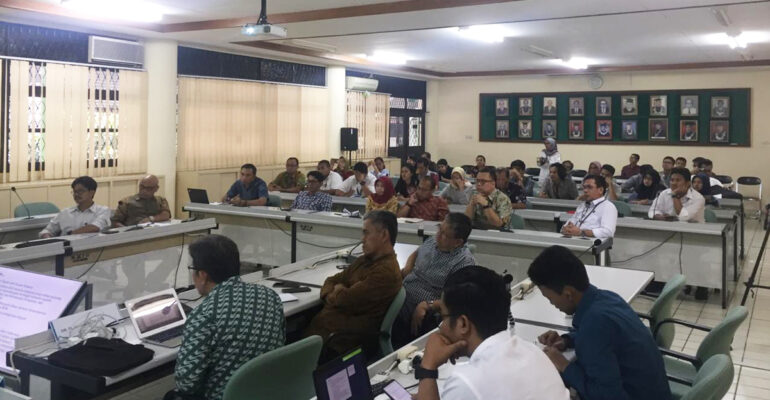Faperta IPB’s FGD: Plantation and Forestry Lands Tenure

The Faculty of Agriculture, IPB University, held a Focus Group Discussion (FGD) “Plantation and Forestry Lands Tenure” in IPB Dramaga Campus, Bogor, Tuesday (28/5). This FGD is held to highlight the land conflicts in plantation and forest areas that are caused by many ownership claims and lack of obedience to the law.
According to the Dean of the Faculty of Agriculture, Dr. Suwardi, this issue was raised on the Presidential Debate a few months ago. The land ownership of the 02 President Candidate was mentioned to be very great in Aceh and East Kalimantan. The 02 Candidate said that he is willing to give back the lands to the state if needed. “This raises many questions if the ownership of the land is already in accordance with the laws and regulations, why should it be returned to the state. Another situation is that there are proposals to open all HGUs (Cultivation Rights) owned by plantation businessmen,” said Dr. Suwardi.
In this FGD, the rights of cultivation rights bearer and whether or not the owners have rights to disburse all information were assessed.
The activity was moderated by Prof. Dr. Budi Mulyanto, Professor of the Faculty of Agriculture, IPB and was attended by Ery Suwondo, S.H. as Secretary of the Ministry of Agrarian Affairs / National Defense Agency (ATR / BPN), Prof. Dr. Ir Yanto Santosa (Professor of the Faculty of Forestry of IPB), Ir. Joko Supriyono (General Chair of the Indonesian Palm Oil Entrepreneurs Association / GAPKI), and Dr. Sadino (Environmental Law Expert and Practitioner).
Ery Suwondo, SH from the ATR / BPN Ministry explained that there were several types of land rights and permits. “According to the Basic Agrarian Law No. 5 of 1960, HGU can be granted within a period of 25 years and for certain purposes can be given a maximum of 35 years. HGU holders can transfer the rights to other parties. Meanwhile, there is a Business Permit for the Utilization of Timber Forest Products in Industrial Plantation Forests (IUPHHK-HTI) that can be extended longer than the HGU to state enterprises, the private sector, and cooperatives. The difference with HGU is that the right to exploit Industrial Plantation Forests (HTI) cannot be transferred to other parties. The land owned by the presidential candidate 02 in Aceh and Kalimantan is IUPHHK-HTI instead of HGU,” said Ery.
According to Prof. Dr. Yanto Santosa from the Faculty of Forestry IPB, the existing conflicts happens because of the holder of HGU or IUPHHK-HTI had to fight alone to solve the problem that is still overlapping with the indigenous people and the locals around the forest. “The government should resolve land permits and problems as well as environmental impact analysis. After it is clear, then it can be offered to state enterprises, private companies, and cooperatives to manage it,” he said.
Prof. Yanto added that Indonesian Forest Area is 125,9 million ha, while the non-forest area, which is used for agriculture, housing, industry, and others, is only 54,6 million ha. “Settlement of land conflicts can be done by reviewing the Provincial Spatial Planning (RTRWP) issues related to space by referring to the balance of the ecosystem. Completion of overlapping use of space must run on statutory rails. Furthermore, it encourages the optimization of the use of forest areas that have been released for interests outside the forestry sector, because there are still many abandoned lands after being changed to become Other Use Areas (APL). Besides that, it is necessary to coordinate with the issuance of permits between the regional government and the central government,” he explained.
Dr. Sadino, an environmental law practitioner, stated that the sources of land conflict were the definition of forests and forest areas. According to the 1945 Constitution, land, water and everything contained in it is controlled by the state and used as much as possible for the prosperity of the people. If there is land overgrown with forests, then the forest must provide prosperity to the people. “If there is not much forest providing people’s prosperity, then it needs to be evaluated on land use, now there is a lot of lands that is not overgrown with forests but is in a forest area,” said Dr. Sadino.
According to Dr. Sadino, the determining of forest area is not fair because it is done unilaterally by the Ministry of Environment and Forestry. This is one source of land conflict. Therefore all land stakeholders must use only one term, namely forest (land overgrown with forest) or forest area (through determination) so that various conflicts can be resolved.
Ir. Joko Supriyono explained that for oil palm plantations which are partially cultivated on HGU land, there are still many land conflicts and there are still many palm oil entrepreneurs who are harmed. Although the Forestry Law No. 41 of 1999 is applied, land conflicts still continued. He proposed the need to revise the Forestry Law so that there would be harmonization of regulations to reduce land conflicts.
Regarding the HGU data that should be open to the public, Professor of Faculty of Agriculture IPB who acted as moderator, Prof. Dr. Budi Mulyanto said that not all HGU data could be opened to the public. Because there are private interests in it that are legally protected by law. According to him, general data regarding the extent and permits of HGU that have been given could be public data, but it is unethical and there is no need for the public to know private data such as the company’s HGU coordinates.
Prof. Memen Surahman, teaching staff of the Department of Agronomy and Horticulture, Faculty of Agriculture IPB which was also present, suggested that many opinions that were conveyed to be summarized in the form of Policy Brief so it can be proposed to the government to be escalated.


